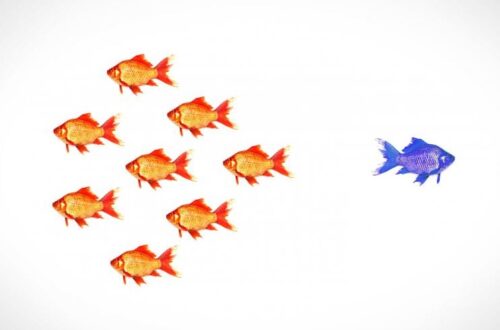
Authenticity: your values, your choice
If you buy an age-old painting for a lot of money, you probably want a certificate that guarantees the authenticity of the painting, so that you can be sure that you are not buying a fake. And if you read in the advertisement of an old house for sale that the ceilings contain “authentic details”, then you expect elegant ornaments.
However, the word ‘authentic’ is often misused. I myself always become somewhat skeptical when tourist attractions promise an “authentic experience”. And “authentic furniture” is usually brand new stuff that only resembles the original style. It gets even more complicated when it comes to people. What do we actually mean when we use the word ‘authentic’ to describe ourselves or other people?
According to the dictionary, the word ‘authentic’ has three meanings: “reliable”, “credible” and “real”. Other synonyms that a simple search on Google yields are in line with the idea that authenticity is mainly about realness: “genuine”, “original”, “like the original”, “not forged”, “true”.
When you think of these descriptions, you quickly think of politicians. For a politician, his or her supposed authenticity is one of the most important characteristics of electoral success today. Politicians must above all “be themselves”, speak the “language of ordinary people” and show their emotions. But the desire to be authentic certainly does not only apply to politicians. Many people today want to be authentic. But what does that mean? And how do you do that, live an ‘authentic life’?
According to Canadian philosopher Charles Taylor, authenticity is about two things: realness and self-determination. By realness he understands the desire “to be in a sense original, to be faithful to yourself”; self-determination means that you are free and “not determined by others.”
So, being authentic, real, original, has a lot to do with wanting to be ‘yourself’ and with freedom. Not being told how to behave, or how to dress, but having the freedom to make your own choices and ‘to be true to yourself’.
That ‘being true to yourself’ is somewhat problematic, because how do you know that you are true to yourself? And what is that ‘yourself’ exactly? Being ‘true to yourself’ presupposes that people have a clear picture of who they are and it is questionable whether that is always the case. I think a lot of people struggle with the question ‘who am I?’ (I’ll get back to that some other time.)
Make your own choices, freely and based on the values that are important to you, and your idea of how you want to live your life – regardless of what other people do.
Moreover, if authenticity is about originality, then the desire to be authentic is at odds with people’s social copying behavior. Instead of authenticity, I’d say herd behavior is prevalent in our society. A lot of people are talking about ‘being your own unique self’, but that persistent desire to be ‘unique’ doesn’t stop people from dressing according to the latest fashion trends, listening to the hottest music, and buying the most popular gadgets.
That is the paradox of the role that marketing plays in our society: Products are promoted with an emphasis on ‘your unique personal lifestyle’, but if that marketing is successful, and the product is sold a lot, then it is no longer a ‘unique personal lifestyle’. The widespread use of the word ‘trending’ in recent years (thanks to social media) neither suggests that the pursuit of authenticity and uniqueness has been very successful. After all, ‘trending’ is an indication of the amount of people who make exactly the same choice.
In short, you could say that nowadays there is nothing unique about striving to be unique – after all, almost everyone strives for this – and meanwhile most people do exactly the same as those around them. In this way, ‘authentic’ and ‘unique’ become meaningless labels. And that is a pity, because in my opinion living a (more or less) authentic life is a valuable endeavor.
The realness and originality that I believe is central to authenticity, is about basing the way in which you choose to give substance to your life on your your own personal motives. Using your freedom to make choices based on your own needs and wishes – not because other people make that choice. Or as the Dutch philosopher Joep Dohmen puts it: “He is authentic who knows no fear of freedom, who has the courage not to conform to the prevailing norms, but who develops his own motives.”
That is exactly what we usually admire in people who we say are authentic: people who have chosen their own path of life apart from existing conventions. People who do not comply obediently with the expectations of their environment, who do not conform to what the majority does or thinks in terms of behavior, appearance or opinions – but starts from what they want themselves – whether that is popular or not.
However, authenticity is not the same as non-conformism. Non-conformism is the refusal to adapt to others. While non-conformism often stems from the desire to ‘not be like others’ (and thus deviating is an end in itself), authenticity is about the motives for deciding whether or not to adapt or deviate.
I think that’s the essence of authenticity: that you make your own choices, freely and based on the values that are important to you, and your idea of how you want to live your life – regardless of what other people do. And if your choices turn out to match those of others, so be it. Then you might be a little less unique, but you can honestly say you are authentic.
It’s your life, the choice is yours.



